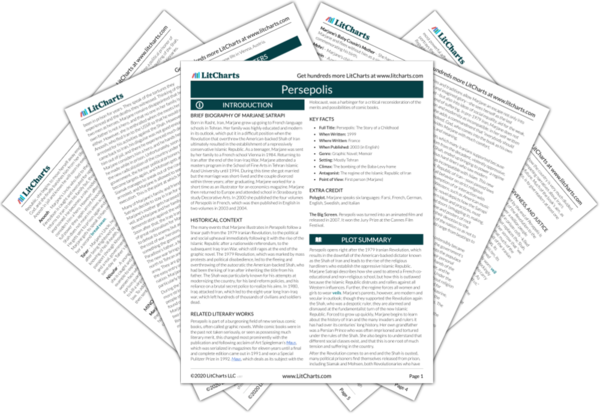Summary
Analysis
This chapter opens with Marjane confessing that her faith “was not unshakable.” She momentarily puts aside her belief that she is a prophet and begins to engage closely with the question of revolution, a topic that is on everyone’s minds now that the ruling Shah has been overthrown. Marjane mock-demonstrates in the family garden with her friends, mimicking the many adults around her who do the same in the street. Waxing philosophical, Marjane describes to her friends that “the revolution is like a bicycle, when the wheels don’t turn, it falls.” She suggests that often in the history of Iran the wheels haven’t been turning.
At this moment in Iran’s history, the despotic Shah has been overthrown but what the new government of Iran will be like is not yet clear. It is therefore a time of excitement, and the children pick up on this excitement, turning the demonstrations into a game. The way that children will pick up on and follow what adults are doing is regularly portrayed in the novel. Marjane’s interest in Iranian history is evident here.
Themes
Marjane turns to the history of Iran as explained to her by her father. Her father describes the history of Iran as “2500 years of tyranny and submission.” The abuse of power, he explains, has often been both from inside and outside. The outside invasions include the “Arab invasion from the West, the Mongolian invasion from the East, and finally modern imperialism,” when European powers sought to control Iran. However, he notes that the tyranny and submission has often been inflicted also by “our own emperors.” As part of her education, Marjane’s parents buy her books to “enlighten” her. She reads about Palestine, Fidel Castro, Vietnam, Karl Marx, Descartes, and the many revolutionaries of Iran who died young deaths. She later gives the cold shoulder to God because she no longer wants to discuss her prophet-hood anymore. Instead, awkwardly, they talk about the weather.
Marjane’s parents do not allow her education to be one-sided or simply Iran-centric; rather than concentrating merely on the invasions and abuses that Iran suffered over the centuries, Marjane learns about other lands who have undergone dramatic times of change, and the individuals who influenced these histories. The particular people she learns about suggests that her parents have “leftist,” perhaps socialist, political leanings. The fact that Iran still exists despite its many iterations and periods is a source of pride for Marjane and her family; they love Iran, despite its many problems. As the revolution against the Shah is successful and Marjane learns about history, she becomes less interested in religion, as her changing conversation with God indicates.
Themes
One night Marjane overhears her parents speaking about the burning of the Rex Cinema, a famous and popular movie theater in Teheran, during the revolution against the Shah. The doors had been locked from the outside before it was put on fire; four hundred people died as the police stood guard and beat away people trying to save the victims. This constitutes a terrible and purposeful massacre. The Shah claimed a group of religious fanatics had committed the crime, but, Marjane claims, “the people knew that it was the Shah’s fault!” Marjane imagines all the ghosts of the dead people fleeing the Rex Cinema.
There still exists a separation between children and adults: Marjane is not automatically invited to difficult and serious discussions. Still, as usual, her parents cannot hide the truth from Marjane, and politics once again enters her private living room and also her imagination. This is a direct example of the internal abuses of power that her father previously spoke about. This history establishes the Shah’s awfulness and in doing so the justness of the revolution against him.
Themes
Standing before a mirror in her room, Marjane puts on a Che Guevara costume and then a Fidel Castro costume, but God, who she has ignored momentarily to listen further to her parents, has left the room by the time she turns around to ask his opinion of her costume. Afterwards, she tells her parents she wants to come with them to demonstrate in the streets against the killing of 400 people at the Rex Cinema, but her parents tell her it is too dangerous. That night God does not come back when she calls for him and Marjane weeps bitterly.
By trying to literally wear the costumes of important revolutionary figures, Marjane demonstrates her attempt at trying to understand and mimic the confusing principles of a revolution that she is too young to really grasp the meanings of. She follows both the examples of the historical figures she has read about, as well as the example of her parents. She wants to play adult, but her weeping and costume-wearing suggest she is not one. The disappearance of God, however, indicates her continuing evolution away from religious feeling and perhaps her slow process of maturation, one which is full of pain and uncertainty.
Themes
Get the entire Persepolis LitChart as a printable PDF.













